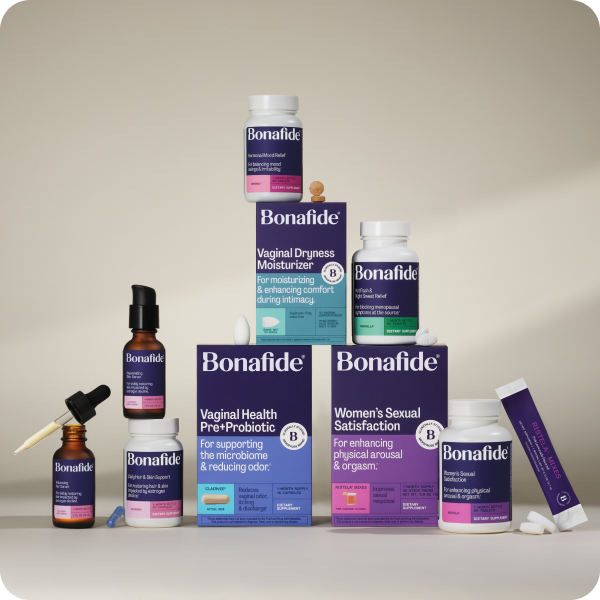With everything going on today, making time for self-care has arguably never been more important. This is particularly true for women in perimenopause or menopause, where fluctuating hormones can impact your physical, emotional, and mental health. But while a dedicated self-care routine sounds great in theory, putting it into practice is quite another story. Women now are busier than ever, with the current pandemic simultaneously piling your daily job, housework, and childcare responsibilities on top of your shoulders.1 It’s no wonder if self-care's not on the top of your priority list right now.
Besides finding the time, finding the space for self-care has become more challenging. Many women are working remotely and spending more time at home in recent months, sharing a space with children, spouses, and other family members. And in many places, the spots women normally go for some “me” time, such as gyms, spas, or even movie theatres, are closed. Even self-care basics, like scheduling an overdue annual well-woman exam, can be a challenge as the pandemic wears on. So what can women who are short on time and space do to prioritize our own wellness during these unusual times?
We can start by resetting expectations around what self-care looks like. As wonderful as a day at the spa or hour-long bubble bath sounds, it may not be achievable right now. Instead, self-care can be as simple as a walk around the block to get some fresh air or taking a few minutes to do some deep breathing exercises. It can even be blasting some of your favorite tunes and taking a dance break (with family or without) in your living room.
The beauty of self-care is that it can take on many different forms, and be tailored to fit shifting individual situations, needs and preferences. For women in perimenopause and menopause, self-care can be a great way to check-in with your changing body and adjust your wellness routine.
Excited by the idea of an achievable self-care strategy, but not sure where to begin? Here are five suggestions to get you started, with additional details on how these tips benefit women approaching or experiencing menopause:
- Unplug: This can be challenging whether you are back in the office or still working from home but try to take at least one break from your devices per hour. Ironically, a number of great apps like ClearLock and Pause have been created in case you could use a little help remembering to unplug. Powering down at least an hour before bed can also help set the tone for a better night’s sleep. Since many women develop sleep problems during perimenopause and menopause,2 removing digital distractions can be one part of a self-care routine that helps you catch more Zzz’s.
- Meditate: If you aren’t someone who meditates, the thought can be intimidating. But developing mindfulness is a great tool to weather times of change, whether a global pandemic or the transition into menopause. And meditating can be extremely simple: instead of stressing out over complicated mantras or clearing your mind, try focusing on your breathing instead.
- Move Your Body: Whether it’s going for a high-energy run, or starting your day with some stretching or yoga, taking time to move your body can not only do wonders for you physically but also mentally and emotionally. An endorphin boost is good for everyone, but exercise has numerous benefits for menopausal women, from fighting weight gain to preventing bone loss. Bonus: this is a great one to do with your family if time alone is a rarity. Robyn dance party, anyone?
- Go Outside: Fresh air and sunshine are Mother Nature’s Rx for wellness. If a hike is out of the question, try something a bit simpler: consider sitting outside while drinking your morning coffee, or go for a walk around the block after dinner with family. According to Bonafide Medical Advisor, Dr. Alyssa Dweck, “the incredible vitamin D is particularly important for menopausal women since it fosters optimal bone health and immune function. A little bit of sunshine does help to boost vitamin D levels, dietary sources are limited, so supplementation is often recommended. A surprising fun fact? Vitamin D is actually a hormone!"
- Call Your Doctor: if the pandemic has caused you to delay your usual preventive healthcare visits, you’re not alone. But as we roll into a new year with no clearly defined end to the pandemic, now is a good time to check-in on your necessary checkups. The list of preventive health care exams changes as we age, but for women who are over 40, routine checks should include a yearly gynecologic exam, breast exam and physical. The good news is that healthcare providers have increasingly evolved in recent months, adopting methods like telemedicine to provide patient care while reducing in-person exposure and risk.
Remember, at the end of the day, you have to take care of yourself in order to be able to take care of everyone else. Self-care is not selfish, it’s a necessity. Go ahead— you’ve earned it!
_____________________
Resources









Comments
Post commentThank you!